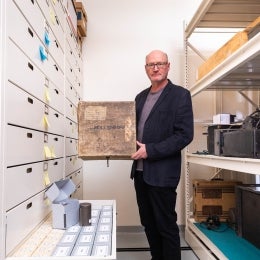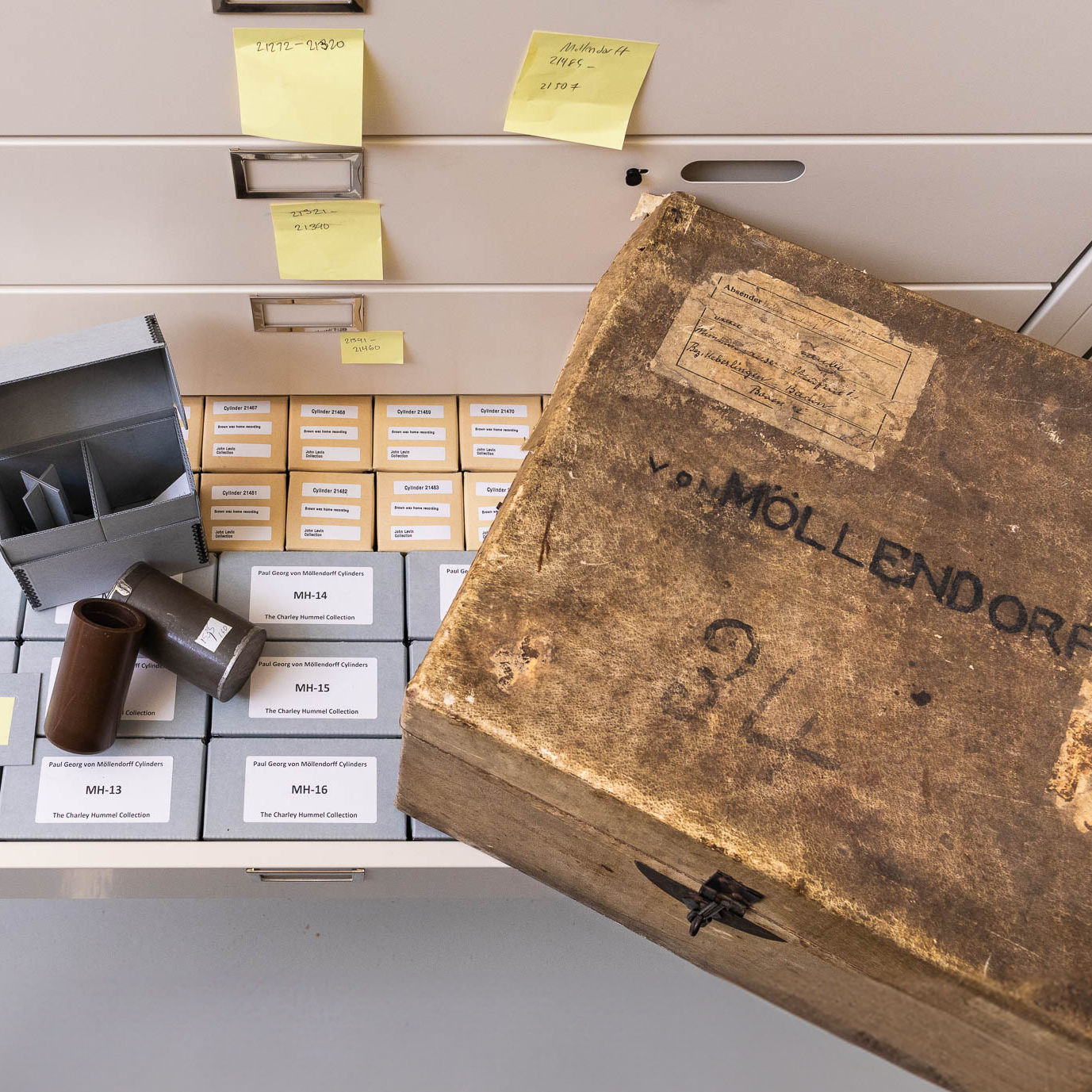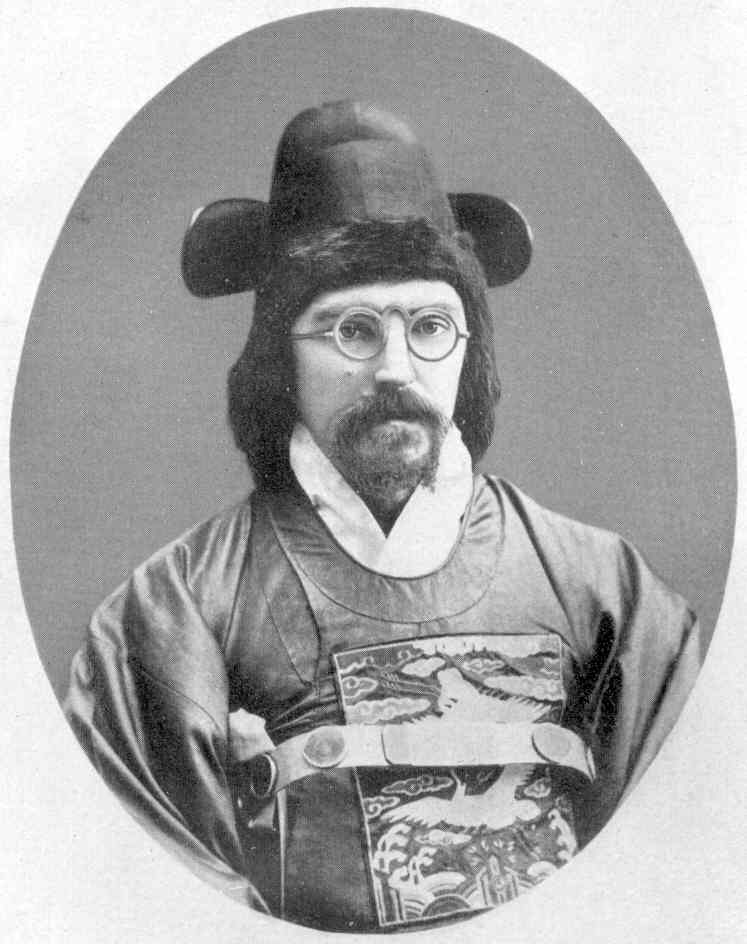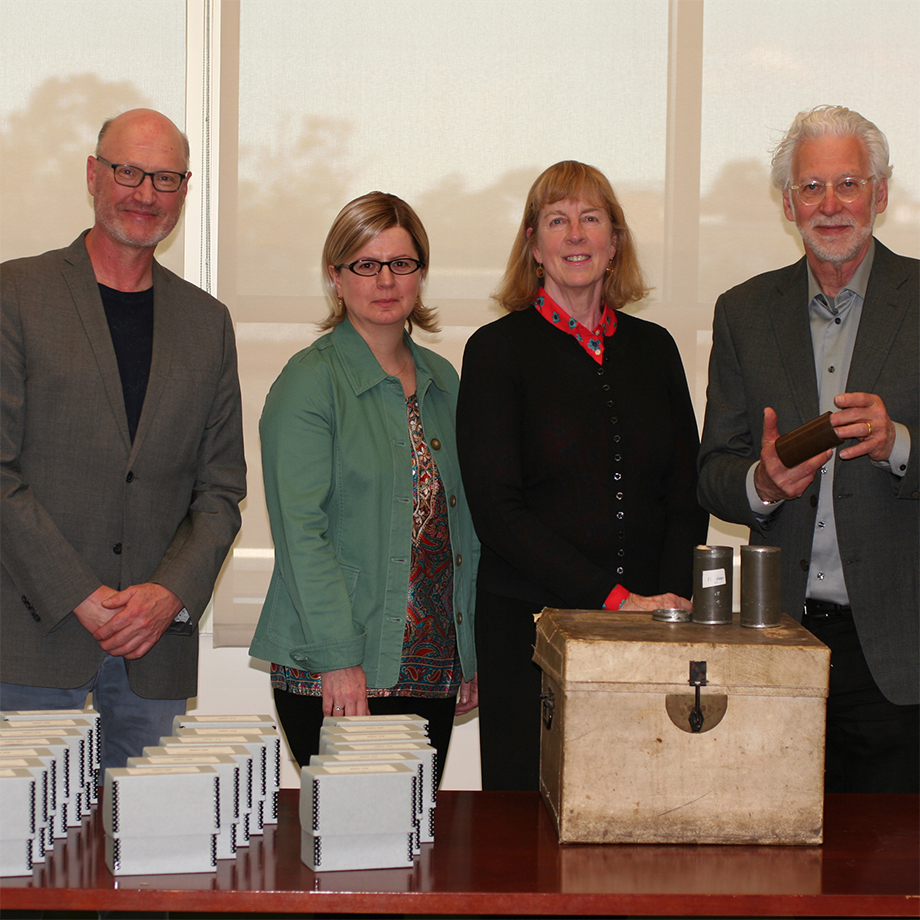
The UC Santa Barbara Library is excited to announce the recent acquisition of the Paul Georg von Möllendorff Chinese Cylinders, a collection of wax cylinders widely considered to be the first audio recordings from China. The cylinders, recorded in the late 1800s by linguist Möllendorff, contain sixteen recitations of a popular, celebrated poem "Returning Home"' by Tao Yuanming. Möllendorff recorded the poem in various Chinese dialects to document the differences in regional languages at the time. Today, the cylinders provide a rare glimpse into the history of Chinese language and include dialects that are considered critically endangered or extinct.
The acquisition was funded in part by the Henry H. Tai East Asian Collection Endowment Fund and made through the Library’s Early Recordings Initiative (ERI), a unique public–private partnership to ensure that cylinders like the ones in the Möllendorff Collection are preserved and made accessible to future generations of scholars. "The Möllendorff cylinders are essentially a sonic Rosetta Stone that holds the key to understanding past cultures," says cylinder collector and ERI co-founder John Levin. "Just as the visual arts give us a glimpse into our collective history, audio recordings can offer insight into the history of a specific time and place that is invaluable to researchers."
 The cylinders could have easily been lost to obscurity if not for the curiosity of collector Charley Hummel and the sleuthing work of two distinguished musicologists. In the early 2000s, Hummel, a renowned American collector of phonograph machines and records, came across a mysterious hide-covered box of Chinese cylinders in a phonograph shop in Paris and was instantly intrigued. The cylinders appeared to have Chinese content on them and the box was conspicuously labeled "MÖLLENDORFF."
The cylinders could have easily been lost to obscurity if not for the curiosity of collector Charley Hummel and the sleuthing work of two distinguished musicologists. In the early 2000s, Hummel, a renowned American collector of phonograph machines and records, came across a mysterious hide-covered box of Chinese cylinders in a phonograph shop in Paris and was instantly intrigued. The cylinders appeared to have Chinese content on them and the box was conspicuously labeled "MÖLLENDORFF."
Hummel purchased the cylinders intending to research their history and asked historians Drs. Patrick Feaster and Xiaoshi Wei to help him unravel the mystery of the cylinders’ provenance. When Hummel passed away in 2023, the cylinders became of interest to UCSB Library because of the historical research provided by Feaster and Wei, who identified the recordings and initiated research about their history with Möllendorff.
 Möllendorff (1847–1901) was a German linguist and renowned diplomat in East Asia. While serving as Commissioner of Customs at Ningbo, China, in the 1890s, Möllendorff undertook an ambitious project to document and classify Chinese languages for the 1900 Universal Exposition in Paris. He asked speakers representing various Chinese languages to recite the same poem into a graphophone and then transcribed the results phonetically. Möllendorff sent the cylinders to Léon Azoulay, a prominent figure in the Société d’Anthropologie de Paris, to feature at the exposition as part of a "phonographic museum" where visitors could take an audio tour of cultures around the world. After the exposition, Azoulay published a full catalog of the contents of the phonographic museum, including the donated Chinese cylinders, which were explicitly identified with Möllendorff.
Möllendorff (1847–1901) was a German linguist and renowned diplomat in East Asia. While serving as Commissioner of Customs at Ningbo, China, in the 1890s, Möllendorff undertook an ambitious project to document and classify Chinese languages for the 1900 Universal Exposition in Paris. He asked speakers representing various Chinese languages to recite the same poem into a graphophone and then transcribed the results phonetically. Möllendorff sent the cylinders to Léon Azoulay, a prominent figure in the Société d’Anthropologie de Paris, to feature at the exposition as part of a "phonographic museum" where visitors could take an audio tour of cultures around the world. After the exposition, Azoulay published a full catalog of the contents of the phonographic museum, including the donated Chinese cylinders, which were explicitly identified with Möllendorff.
The collection’s history after its exhibition in 1900 was unknown until Feaster and Wei pieced together a theory, hypothesizing that "Möllendorff intended to send additional sets of cylinders to London, Berlin, and St. Petersburg, to complement the set he had sent to Paris, but that his unexpected death on April 20, 1901, derailed these plans, such that the cylinders instead ended up being disposed of in some other way—i.e., passing into the possession of his daughter Dora." The location of the cylinders in the following 100 years until they were acquired by Hummel is unknown to this date.
A Newton International Fellow at the School of Oriental and African Studies (SOAS), University of London, Wei plans to publish the content along with other materials from the collection that are currently in private hands to create a box set with scholarly notes to contextualize their value. "The recitations on these cylinders are very musical – almost performances – and are ripe for research," he remarked. "Some of the dialects are unknown and the language varies by region, even down to a localized area in China that is specific to the identity of the people in that community."
 Only some of the recordings have been transferred and digitized with many more to be restored. Now, as part of the Performing Arts Collection at UCSB Library, the cylinders’ long-term preservation and accessibility is ensured. As part of ERI, the Möllendorff cylinders will receive the scholarly attention and online publishing they deserve. The cylinders are also unique to the Performing Arts Collection because unlike most of the recordings in the collection which were published for entertainment purposes, these cylinders were created as linguistic artifacts.
Only some of the recordings have been transferred and digitized with many more to be restored. Now, as part of the Performing Arts Collection at UCSB Library, the cylinders’ long-term preservation and accessibility is ensured. As part of ERI, the Möllendorff cylinders will receive the scholarly attention and online publishing they deserve. The cylinders are also unique to the Performing Arts Collection because unlike most of the recordings in the collection which were published for entertainment purposes, these cylinders were created as linguistic artifacts.
"The Möllendorff cylinders are undoubtedly more valuable as part of the public domain rather than a private collection, where they would have remained largely unpublished," says Performing Arts Curator David Seubert. "At UCSB, they have the potential to influence scholarship and research with partners in France, where the remaining cylinders live, and with other international centers of musicology. This is exactly the kind of effort that is supported by ERI, which strives to prevent valuable early recordings from disappearing into obscurity."
More Information
Listen to the Möllendorff Chinese Cylinders
Image Captions
- Performing Arts Curator David Seubert holding the hide-covered box that contained the Möllendorff Chinese Cylinders collection purchased by collector Charley Hummel.
- Close-up of two cylinders and the box that contained the collection.
- Paul Georg von Möllendorff
- Performing Arts Curator David Seubert, Associate University Librarian for Research Resources and Scholarly Communication Lidia Uziel, University Librarian Kristin Antelman, and ERI co-founder John Levin (left to right).


